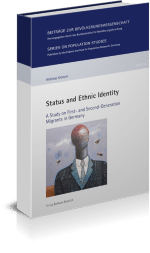
New with Budrich:
About the book
Migrants’ minority and majority identity are controversial political topics, which disclose challenges of integration and social cohesion. Based on a two-dimensional model of ethnic identity, the book asks about the role of social status for migrants’ identification with their origin group and the majority population. It focuses on intergenerational differences, migrant visibility, status mismatch, and exposure in the receiving country. Results reveal forms of ethnic identity beyond the classical assumption of mutual exclusiveness, which suggests that minority identity primarily relates to lower status positions and majority identity to higher status positions.The book thus contributes to the important discussion about migrant assimilation and alternative forms of incorporation.
Dear Andreas Genoni, in your book you ask about the role of social status for migrants’ identification with their origin group and the majority population. What are you specifically interested in?
The aim of the book is to help readers developing a better understanding of how migrants’ social status is linked to their ethnic identity. There is the widespread assumption that migrants with high social status are predominantly oriented towards the majority population of the receiving society. On the other hand, migrants with a low social status are often expected to be mainly oriented towards their ethnic group of origin, which often represents a minority group in the destination country. In my work, I scrutinise these assumptions by studying migrants’ minority identification in combination with their majority identification across levels of social status. I thereby show that the relationship between status and ethnic identity is more complex than often assumed. In search of explanations for this complex relationship, I investigate whether differences between the first and second migrant-generation, migrants’ recognisability to the majority population, and overqualification contribute to better understand how social status relates to migrants’ feelings of belonging. Moreover, I also explore the relationship between status and ethnic identity among migrants of different ages in order to assess whether it changes over time.
What kind of study is your research based on?
My research is based on data from the German National Educational Panel Study (NEPS). NEPS is financed by the German Federal Ministry for Education and Science and is located at the Leibniz-Institute for Educational Trajectories. The study follows persons at different stages in their lives. For my research, I drew on NEPS’ adult sample, which follows persons living in Germany who were born between 1944 and 1988. NEPS offers excellent opportunities to study the relationship between status and ethnic identity because it not only surveys individuals over a large age range but also provides detailed information on persons’ educational and occupational history, their country of birth, and migrants’ feelings of belonging.
Were there any findings that surprised you?
My research on overqualification and migrant recognisability addresses the so-called integration paradox. This phenomenon describes the situation in which migrants with higher social status show weaker majority identification than those migrants with lower status. By studying migrants’ majority identity in combination with their minority identity, I extended the perspective on the integration paradox and found that high-status migrants who are overqualified or more recognisable to members of the majority population not only identify less with the majority population, but also less with their group of origin. Such a weak ethnic identity is often associated with precarious living conditions and resource deprivation and therefore usually attributed to low-status migrants. However, the findings of my book indicate that weak ethnic identity is a phenomenon across status levels, and that it does not necessarily express a cosmopolitan orientation among high-status migrants—as it is often assumed. My research thus calls for further investigation on the factors that promote weak ethnic identity of migrants across levels of social status.
Does ethnic identity continue to play a central role among first- and second-generation migrants or are other aspects of belonging becoming more important?
Ethnic identity is an umbrella term that comprises various aspects such as values and beliefs, behaviour, or emotional identification. Emotional identification with ethnic groups, or the degree to which migrants feel belonging and attached to a certain group, is often regarded as the key aspect of ethnic identity. Why is that? Many researchers argue that every human being wants to belong to others for survival and reproduction, to feel secure, and to feel recognised, respected and loved. For migrants, their group of origin and the majority group in the receiving society are often very important. By living abroad, people become particularly aware of these groups’ characteristics. On the one hand, this includes cultural values, norms, and behaviour of their group of origin, and on the other hand potentially unknown cultural features they learn about in the receiving society. Therefore, ethnic identity often represents an important aspect of the self-image of immigrants and their descendants. In this context, weak ethnic identity or even disidentification is not necessarily an expression of lacking importance of ethnic belonging. These forms of ethnic identity can be interpreted as signs of experienced deprivation or emotional distancing to prevent discrimination and negative stereotyping, highlighting how essential ethnicity and feelings of belonging really are.
This is why I have chosen Barbara Budrich as my publishing partner:
With Barbara Budrich, I had a committed and very supportive publisher by my side. I was kept informed about the publication status of my work and integrated in the publication process. I was very grateful for receiving much support regarding the dissemination of my work. The communication was efficient and always smooth and friendly, despite pandemic-related issues.
Short vitae of the author
 Andreas Genoni studied sociology, cultural anthropology and educational science at the University of Basel, the University of Applied Science and Arts, Northwestern Switzerland, and at the Freie Universität Berlin. He received his doctoral degree from the University of Hamburg, where he worked in a research project on monetary and non-monetary returns to education of migrants and non-migrants. Since late 2019, Andreas Genoni is a research scientist at the Migration and Mobility Research Unit at the Federal Institute for Population Research in Wiesbaden, Germany. There, he is a project member of the German Emigration and Remigration Panel Study, a longitudinal survey that follows Germans who either left Germany or returned from abroad to examine the individual consequences of international migration.
Andreas Genoni studied sociology, cultural anthropology and educational science at the University of Basel, the University of Applied Science and Arts, Northwestern Switzerland, and at the Freie Universität Berlin. He received his doctoral degree from the University of Hamburg, where he worked in a research project on monetary and non-monetary returns to education of migrants and non-migrants. Since late 2019, Andreas Genoni is a research scientist at the Migration and Mobility Research Unit at the Federal Institute for Population Research in Wiesbaden, Germany. There, he is a project member of the German Emigration and Remigration Panel Study, a longitudinal survey that follows Germans who either left Germany or returned from abroad to examine the individual consequences of international migration.
 Order now via our shop
Order now via our shop

